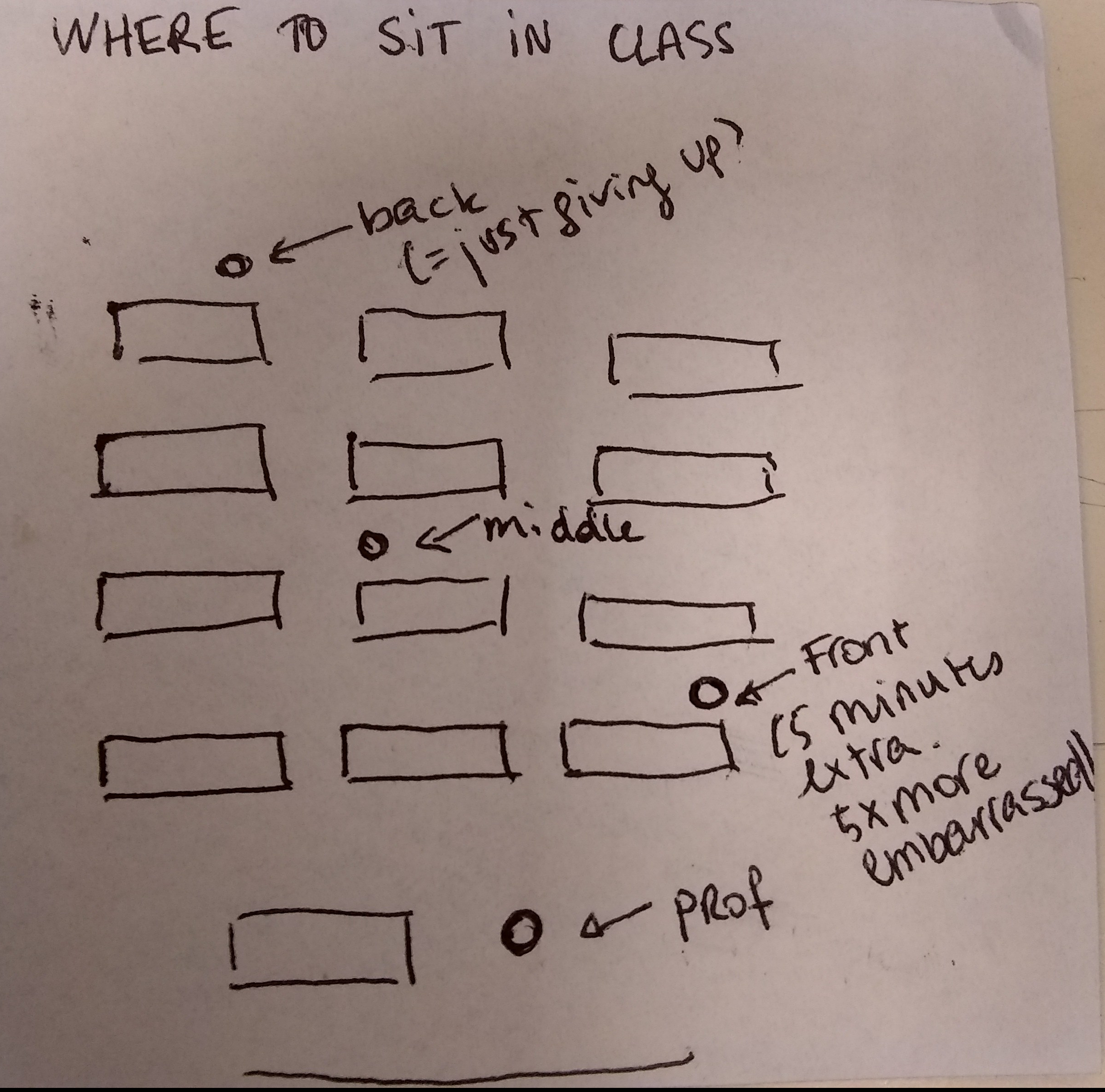I have a track record of falling asleep in inconvenient locations. Basically, if I’m sat down and not actively doing a physical or mental activity, I will doze off.
I fall asleep in the car – fortunately only when in the passenger seat. I fall asleep on the bus and on the train – often resulting in neck pain for the following days. I fall asleep during short plane trips, though not really during long ones – apparently trying to actually fall asleep counts as one of those mental activities that keep me awake.

And I fall asleep during lectures and seminars.
I remember it starting in maybe my third year of undergrad, though probably I’ve been caught dozing during classes before [I distinctly remember seeing photographic proof for this, but I can’t find it anymore, so I guess that means it never happened]. To the hilarity of my classmates, and to my own horror and embarrassment, I was not able to stay awake.

I was reminded of this recently when I attended the local grad seminar. The guy next to me was either accidentally prodding me just when I was dozing off, or was helpfully trying to nudge me awake. I still don’t know which one of the two it was, but because we never exchanged so much as a glance once the seminar was over, I presume it was just all an accidental coincidence. Or a coincidental accident.
I want to point out to everybody who as ever talked at me, that me falling asleep during a talk is not necessarily related to the amount of sleep I’d had, nor a reflection of the quality of the presentation (well, partially, I will elaborate on that in a minute*).
At some point, I even asked for help from a therapist. Her tips to stay awake included: wearing a rubber band on my arm to flick myself with (apparently, the acute pain would give me a short surge of adrenaline), eat something during class (but apples are kind of loud to chew on), or doodle.
It turned out that multitasking did help – a bit. For a little while. But even with elaborate note-taking, which wasn’t my forte – there are countless examples of lecture notes starting out optimistically during the first 15 minutes of class and then trailing off into nonsense and eventually just blank lines – and reading things on my phone – it always seemed a bit rude even though I was literally not paying full attention in order to pay more attention, nothing really worked. The few occasions where I remember staying awake, I either basically wrote a complete comedy set (needless to say, I actually didn’t pay attention to the speaker) or it was because the professor giving the lecture was exceptionally engaging to listen to.
And I really mean exceptionally engaging. Seriously, my demands are unreasonably high. That specific professor taught beginner quantum mechanics to a bunch of quasi-engineers. He just oozed interest in his subject, had just the right amount of quirkiness, and didn’t rely on powerpoint presentations. His classes were all chalk and blackboard. Not that chalk is a requirement for an engaging talk, but the fact that I had to take notes at the same speed as he was teaching, probably helped me stay alert. And awake.
Nevertheless, it seems that a lot of public speaking events in the scientific world, whether it’s lectures or conference talks, are notoriously sleep-inducing.

While I realize my requirements for a talk that would keep me awake are unrealistic (I’ve been in talks that I genuinely found really interesting and still fell asleep), and I am in no way – I repeat: in no way – an expert in public speaking, I do have some suggestions on how to make your (scientific) talk just that tad more engaging**:
Tip number one – Be interested in what you are talking about. I know, that sounds really obvious, but the number of times you get the impression that the speaker doesn’t really believe in the things they are saying happens more than it should. I know that when I had to give talks about things I didn’t really care about, I definitely went into drone mode. I’m sorry for anybody who had to sit through that.

Tip number two – Tell a story. Things are a lot more interesting to listen to if they have a beginning, a middle and an end. And some evil villain you had to fight (which could be a protocol that just wouldn’t go right, or that bug in your code, or your lack of general motivation). The Alan Alda Center for Communicating Science gives workshops on using the power of narrative in scientific communication. You can still do the intro – methods – results – conclusion thing, just make it more of a story. Also, while you’re at it: be honest. If that experiment took months to get right, it’s okay to say so. Everyone in science has been through some kind of struggle to get data, but most people only show the shiny, polished end results. Every time someone showed some intermediate (failed) results in a talk, it’s gotten some laughs.
Tip number three – Experiment. Figure out what works for you. When I’ve had to give talks as a student for classes or during group meetings, which are generally all safe, I’ve treated it as an experiment. I’ve tried different presentation programs. I’ve tried not adding any text on my slides. The latter experiment failed miserably; I completely forgot what I was supposed to talk about, but luckily there was it was not a very important talk and the audience were all people I knew. Don’t try something completely new for your thesis talk, obviously; use “casual” presentations for experimentation.

Tip number four – Present a lot. Take every opportunity to practice. Try different types of settings. The only way to gain more confidence in presenting is to actually do it. I know, it sucks, but repetition actually works.
Tip number five – Be you. Add some personality to your talk. If you like to tell jokes, make a joke. If you enjoy adding a meme or two, just to it. Whatever floats your boat. The best talk I ever gave (in my *humble* opinion) involved me singing some songs about cancer and forces. At an actual conference. Obviously, the setting allowed for it, and I checked with the organizers first, but the response I got was overwhelming and a definite confidence boost. I took a risk to put some “me” in the talk, and it paid off.
Tip number six – This one is the most important one, I think. Keep it simple. Imagine you have to give the talk to a bunch of middle-schoolers. You want it to be engaging, you want your research to sound cool, you don’t want to overdo it with jargon and acronyms and walls of text. Even if your audience isn’t actually a bunch of 12-year-olds, this still applies. Be engaging, don’t overcomplicate things, and tell your audience why your research matters! The same rule counts in writing, actually. You can check what “grade” your writing style is for on this site, for example, what I’ve written here is about at great eight (I’m glad, it would have been embarrassing if I didn’t adhere to my own rule!)
We don’t all have to be excellent public speakers. But we can all at least try to not be awful speakers, and we can definitely try to not be sleep-inducing speakers. Well, except if I’m in the audience, then it’s all futile.
* Not sure if it actually will be in a minute, it all depends on your reading speed.
** This list is in no way to be considered a guide on how to make a good presentation. There are plenty of those on the internet (usually they come down to: don’t put too much info in your talk, don’t use too much text – pictures speak louder than words, repeat your take-home message – maximum three main points, and some more things to that effect).
*** This picture, however, shows my excellent photoshop skills!


